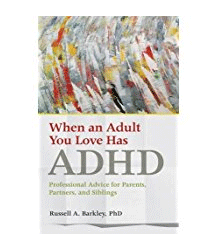“When an Adult You Love Has ADHD: Professional Advice for Parents, Partners, and Siblings”

“When an Adult You Love Has ADHD: Professional Advice for Parents, Partners, and Siblings”
By Russell A. Barkley, Ph.D.
American Psychological Association
Washington, D.C., 2017
Invaluable advice given about adult ADHD
Reviewed by James K. Luiselli, Ed.D., ABPP, BCBA-D
Russell A. Barkley is a clinical neuropsychologist with more than 40 years of experience as a researcher, therapist, consultant and teacher in the area of attention deficit hyperactivity disorder.
He is a recognized expert in ADHD who has written 22 books, published hundreds of professional articles, delivered scholarly presentations worldwide and been featured in many training videos, television shows and radio programs.
For this book, Barkley prepared a self-help guide in which he shares his “professional and personal knowledge about ADHD with others who are parents, siblings, partners or close friends to a loved one experiencing adult ADHD.” The product is a remarkable compilation of clinical and research-informed advice that will surely resonate with his target audience.
The book is organized in two parts, beginning with chapters about “What You Need to Know About Adult ADHD.” In quick summary, these chapters consider the diagnostic criteria for ADHD, etiology, co-morbidity, consequences of untreated ADHD, and impact of ADHD on significant others.
One of the most compelling chapters in part 1 of the book addresses the popular contention that having adult ADHD represents a gift, or in Barkley’s words, “a good thing.”
He thoroughly dismisses this notion while at the same time delivering a very positive message that the symptoms of ADHD “may interact with other talents or gifts of the individual, high intelligence, a supportive family or social environment, and special resources so as to not preclude people from being successful.”
Part 2 of the book covers “What You Can Do to Help.” In the beginning chapters, Barkley deftly handles the first steps of speaking to a loved one who has ADHD about recognizing the condition, acquiring knowledge and seeking treatment. Like every other chapter in the book, his guidance and recommendations are stellar.
Barkley’s treatment orientation begins with his strongly supported assertion that ADHD is fundamentally a disorder of self-regulation and executive functioning. He directs significant others to focus an adult with ADHD toward performance objectives by “doing what you know.”
His many practical tips, which capitalize on external cues and current-day technology devices, are uniquely suited to person-specific performance weaknesses.
Other treatment approaches explained in the book are individual counseling, cognitive-behavior therapy, vocational assistance, and coaching. The relative strengths of each method are reviewed in the context of multi-faceted treatment that is so commonly required with adults who have ADHD.
On the topic of medication for treating adult ADHD, Barkley concludes that “for the majority of adults with ADHD, especially those with moderate to severe symptoms, medication management should be the core component around which to build other treatments.”
He then presents what I consider to be the most concise, informative and evidence-supported details about medication options in adult ADHD I have seen in any professional publication!
The confines of a brief review prevent me from fully describing other helpful chapters in the book. Suffice to say, they deal with matters such as unproven treatment for ADHD, caring for an adult with ADHD at home, promoting success on the job, contending with health risks and accessing government programs relevant to ADHD.
“When an Adult You Love Has ADHD” is a shining example of high quality professional advice in the form of an accessible, timely and comprehensive self-help book. Anyone concerned about a family member, relative, friend or colleague will find the book an invaluable roadmap for navigating a complex but highly treatable disorder.
Professionals, too, should recommend the book to clients who are struggling with adult loved ones who may have or were diagnosed with ADHD. ADHD clients themselves will find direction by reading the book.
Finally, Barkley not only demonstrates his formidable expertise throughout the book but also relates his own experiences with a brother, nephew and relatives who were profoundly impacted by ADHD. His personal and sensitive reflections add further to the truly magnificent help this book offers to parents, partners and siblings.
James K. Luiselli, Ed.D., ABPP, BCBA-D, is Chief Clinical Officer, Clinical Solutions, Inc. and North East Educational and Developmental Support Center, Tewksbury, Mass.
Learn more about the book: When an Adult You Love Has ADHD: Professional Advice for Parents, Partners, and Siblings
